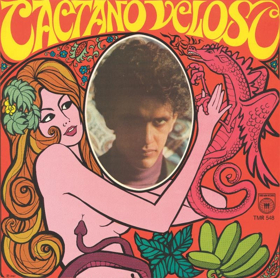Caetano Veloso to Reissue Self-Titled Debut Album

Caetano Veloso will reissue his 1968 self-titled debut album, to be released March 8, 2019 via Third Man Records. This will be the first authorized North American vinyl issue of this seminal album. Third Man has partnered with Vinyl Me, Please for the exclusive limited version of the album -- learn more about the limited version HERE, and pre-order the standard black version HERE.
Caetano Veloso's self-titled debut solo album is one of the most important and influential Brazilian (and, dare we say, South American) albums of all time. With the release of this seminal album, Veloso would become the leading voice of the Tropica?lia art movement, which took place in Brazil in the late 60's.
The Tropica?lia art movement of the late 1960s, with flourishes in visual art, poetry, theatre and music, is one of Brazil's most adored cultural concoctions. It was a movement which began out of necessity, shortly after a repressive military dictatorship seized power after 20 years of peaceful democracy. The term Tropica?lia first came from the mind of Brazilian visual artist He?lio Oiticica, whose eponymous piece consisted of a sandy maze bordered by tropical Brazilian flora and, at the end, a television set.
The songs on Veloso's album immediately connected with people. "Alegria, Alegria" was his breakout hit that gained traction as a hymn for liberty advocates, juxtaposing images of Coca Cola, guerrilla groups, bombs and Brigitte Bardot as part of the everyday experience. The album's first song, "Tropica?lia," was an anthem for the whole movement; it's a fragmented allegory, a structure borrowed from friends in the concrete poetry scene, touching on divergent cultural symbols, events, allusions and idioms, nimbly representing and critiquing the many contradictions in the new Brazilian dictatorship.
Unfortunately, these cleverly veiled jabs in Veloso and his contemporaries' bodies of work gained greater and greater exposure as the movement became more and more popular, leading to the arrest, imprisonment and forced exile of Veloso and many of his cohort. Despite these difficulties, the Tropicalists continued creating in exile, strongly influencing artists both at home and abroad.
The Third Man vinyl issue has been remastered from original mono mixes by Warren Defever and Bill Skibbe at Third Man Mastering in Detroit, Michigan and sounds as warm and rich as the first pressing. Whether you're a longtime fan or first-time listener, Third Man Records could not be more proud to spread the compelling story of this album, this artist and the Tropica?lia movement.
Comments
Videos

